Sir John Monash, Personal Files Book 1, 5 November - 15 December 1914 - Part 4
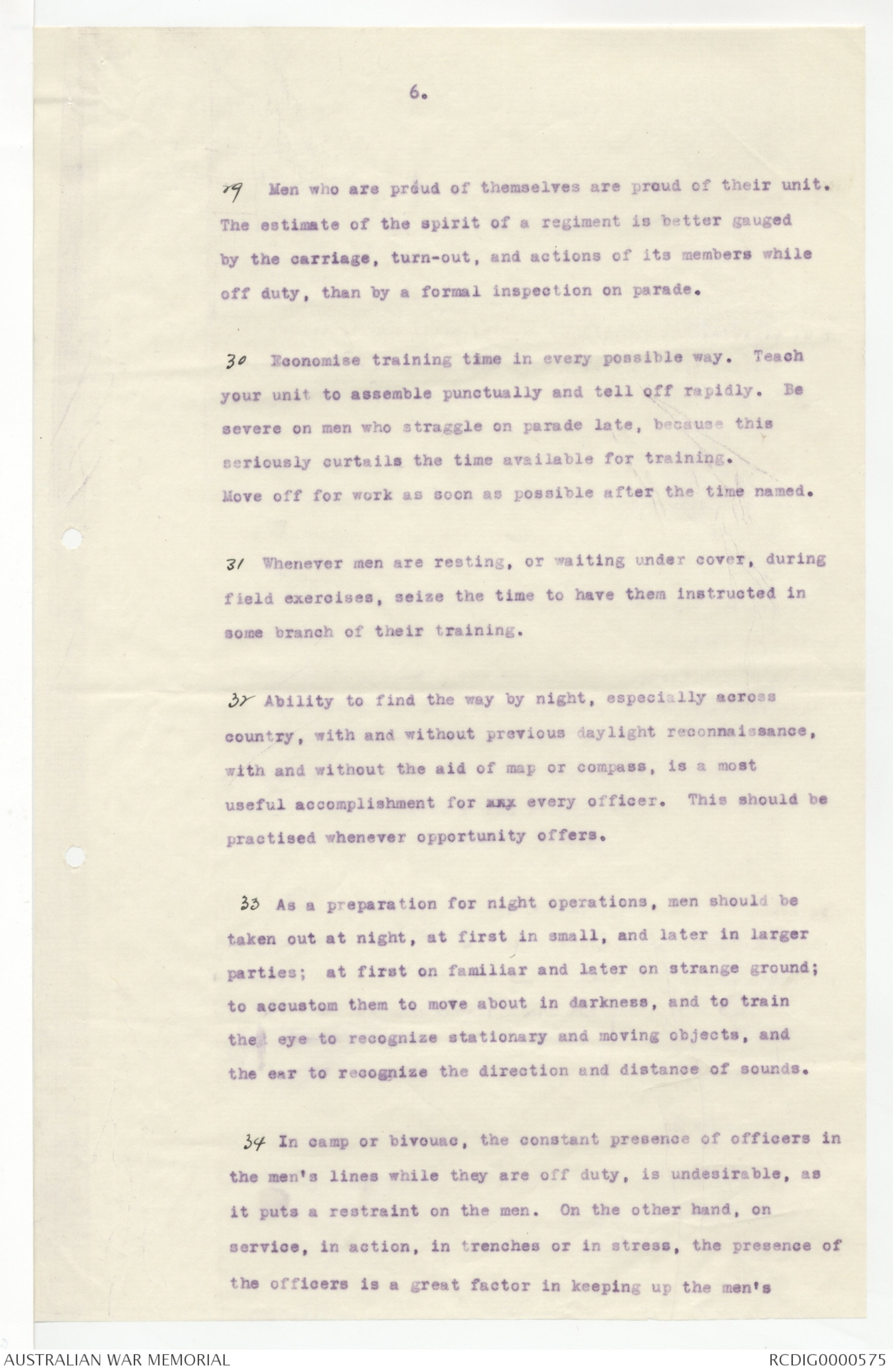
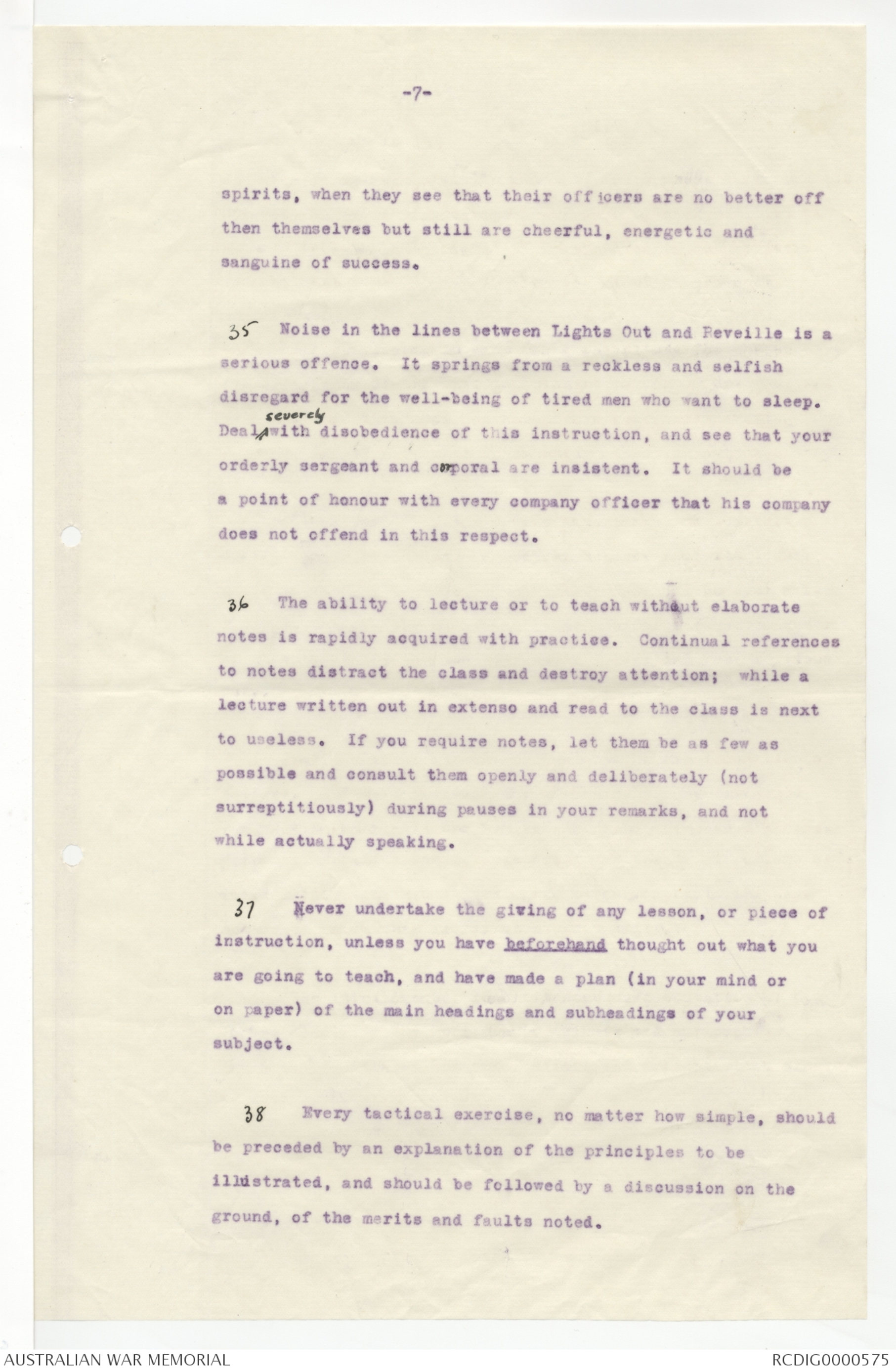
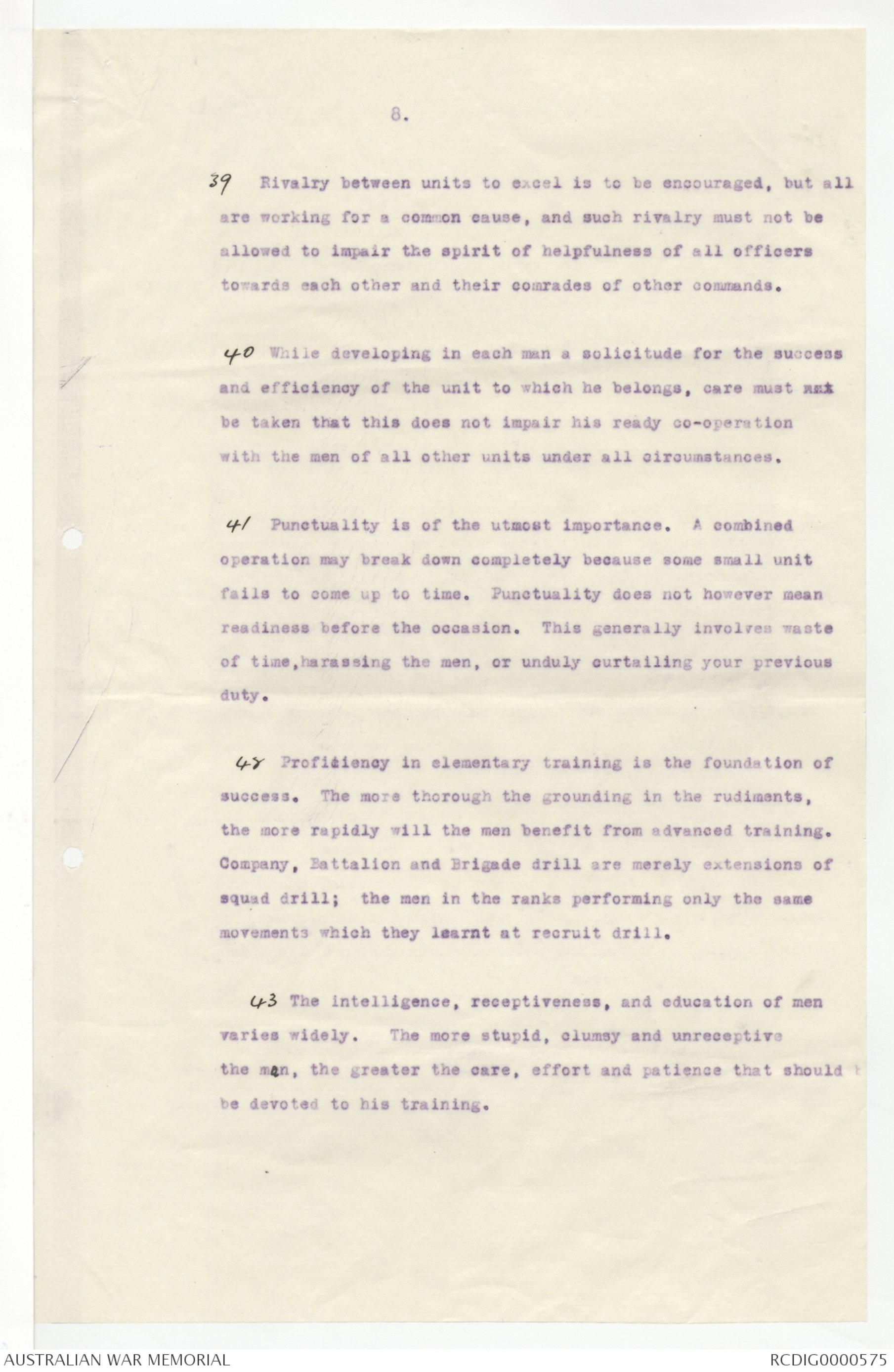
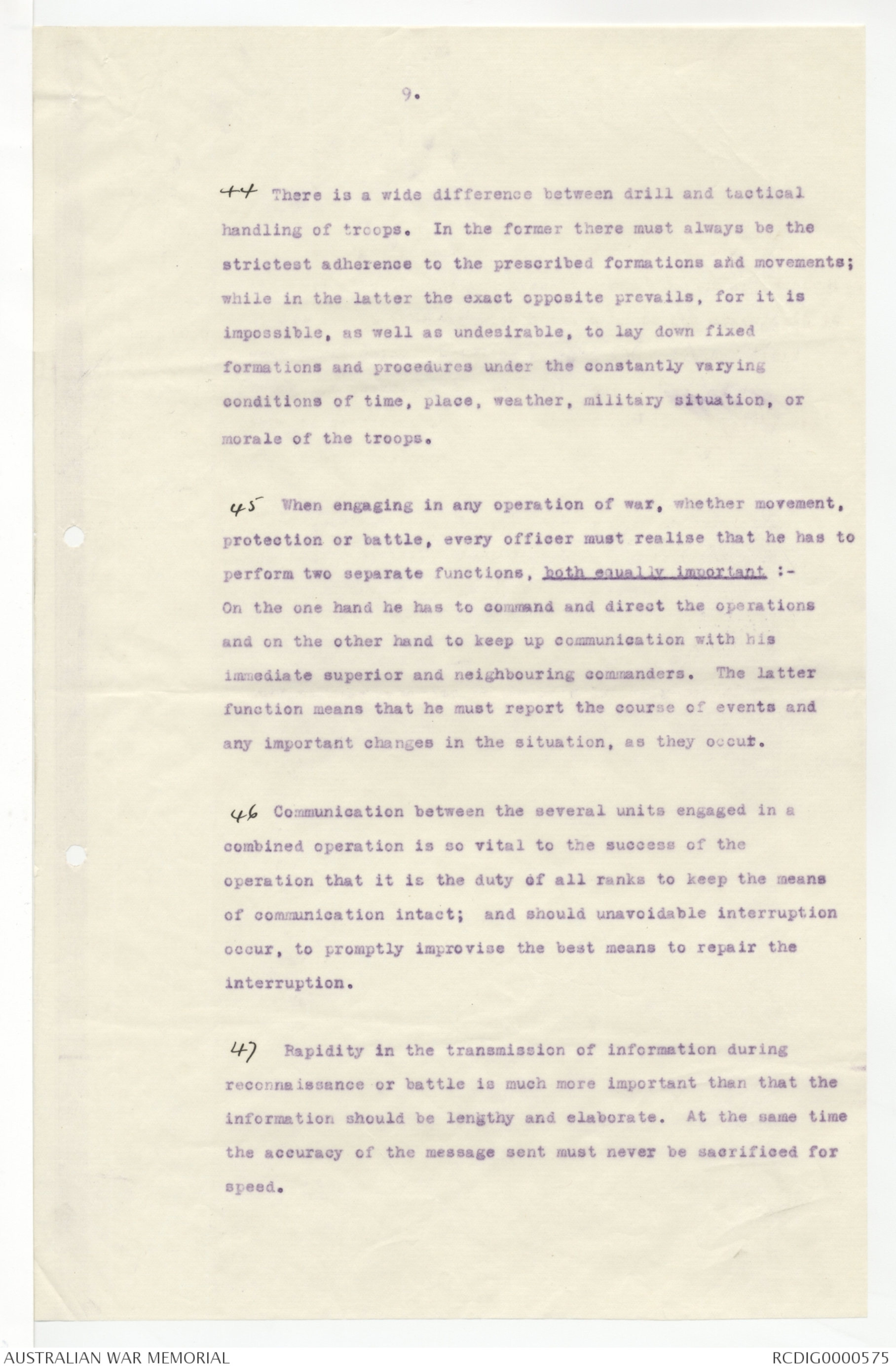
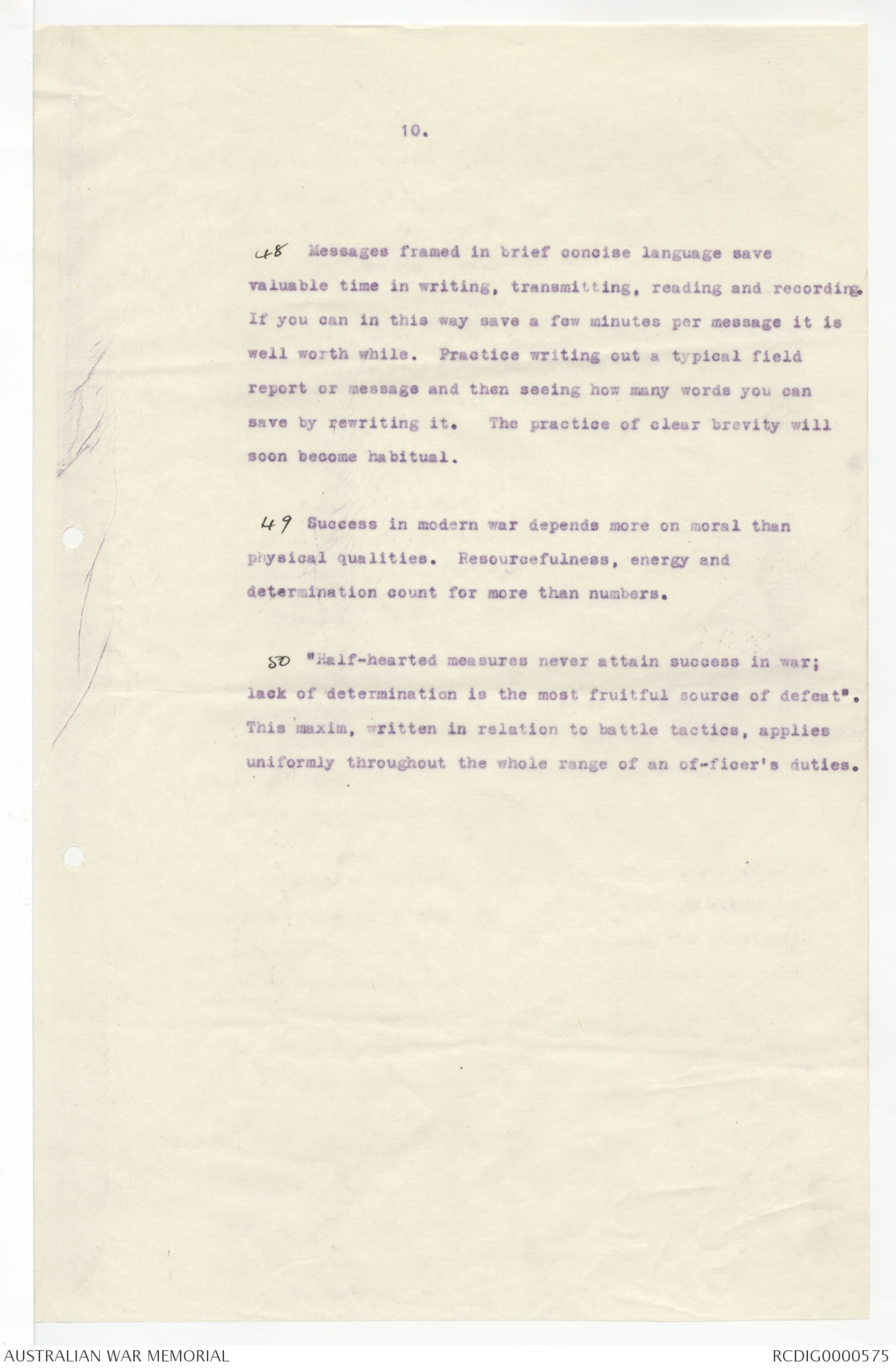
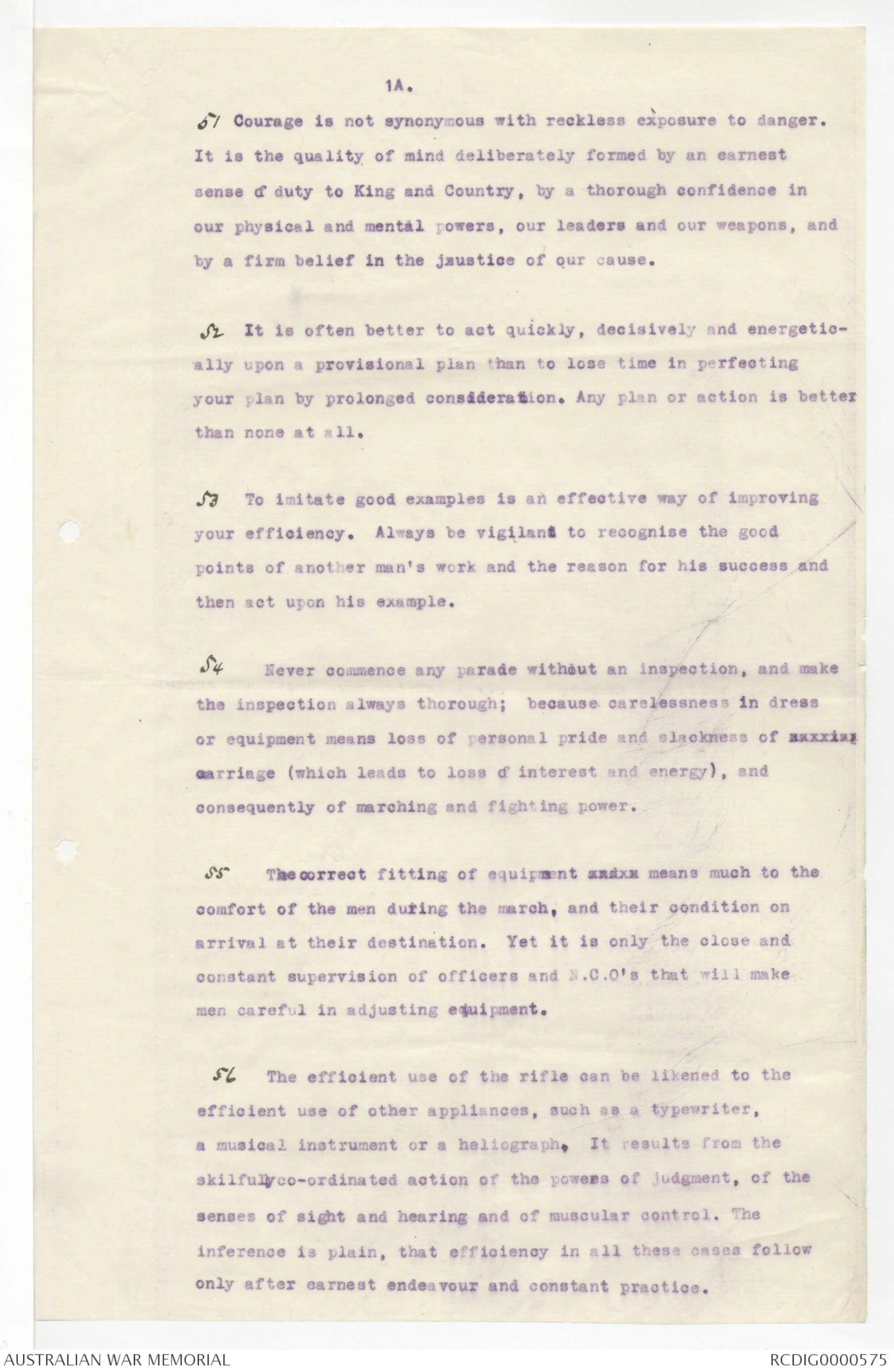
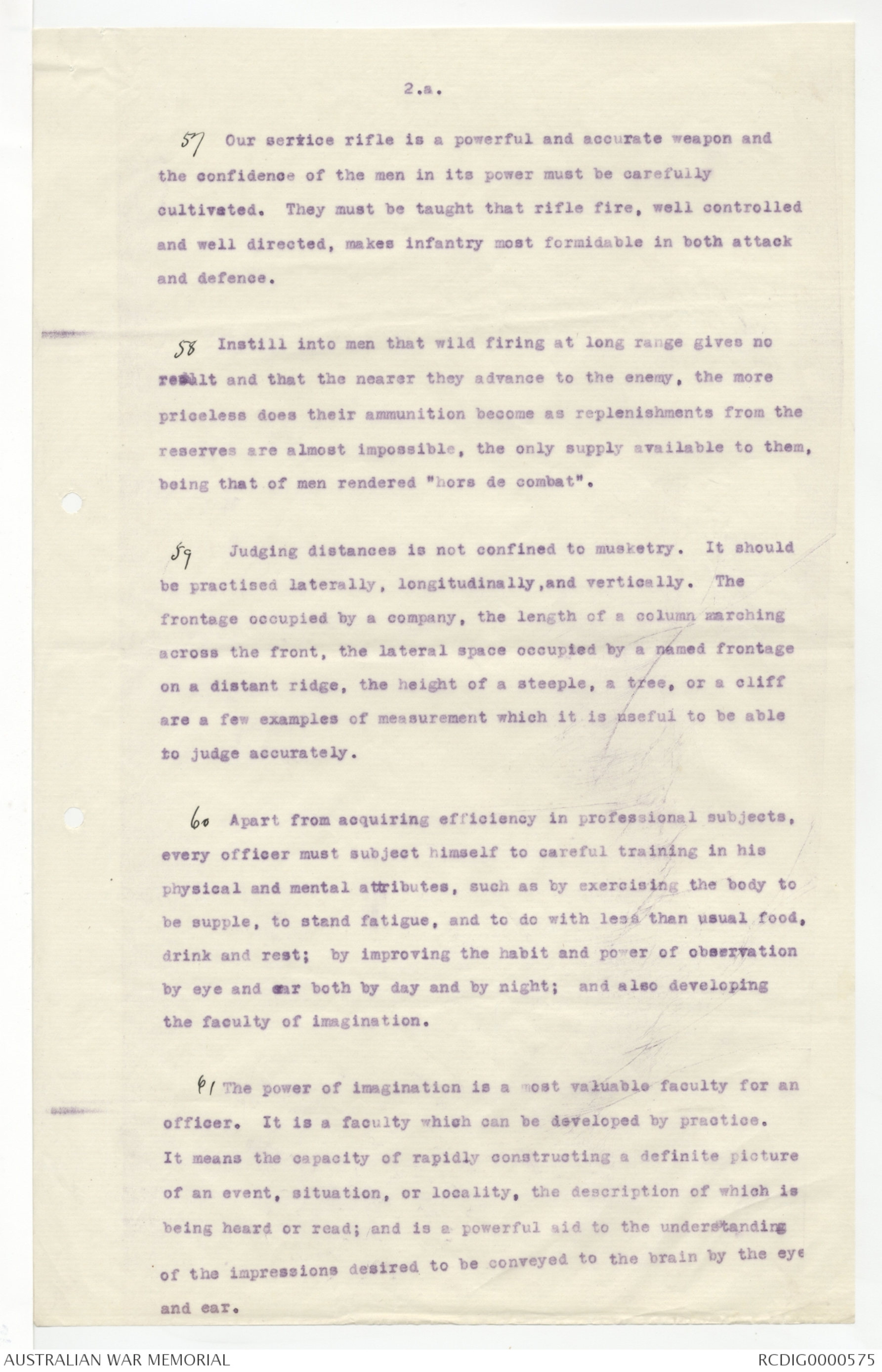
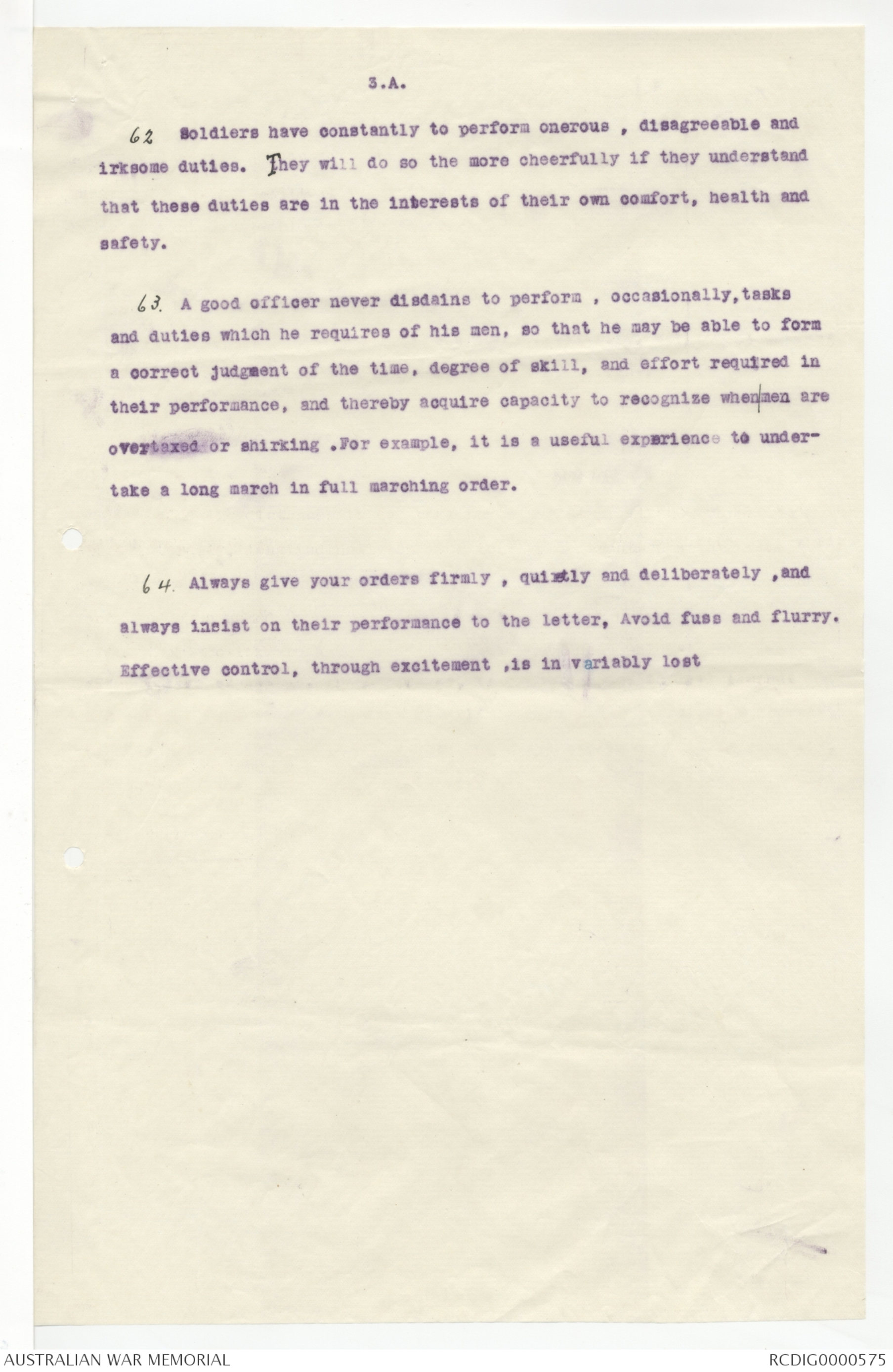
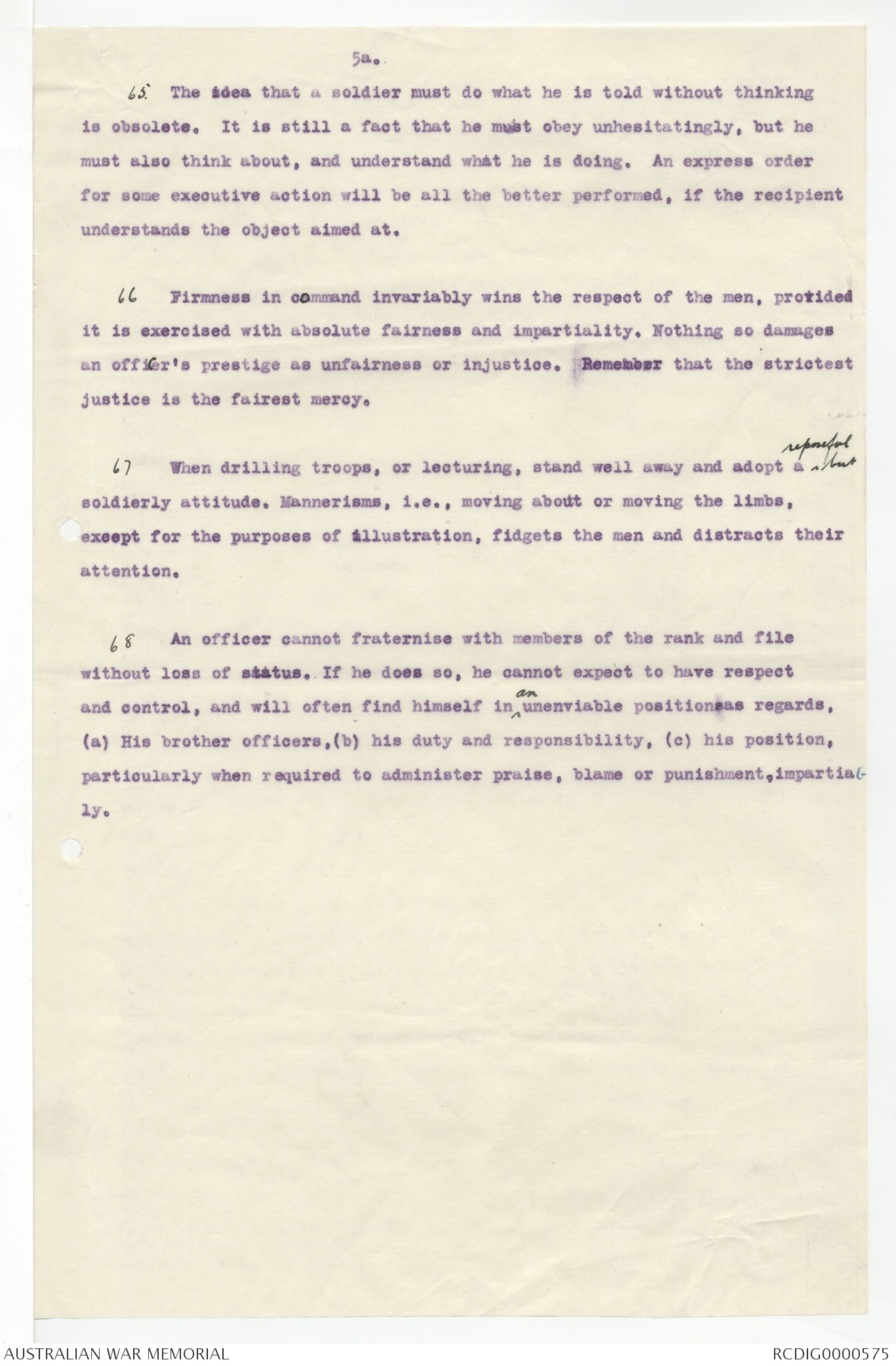
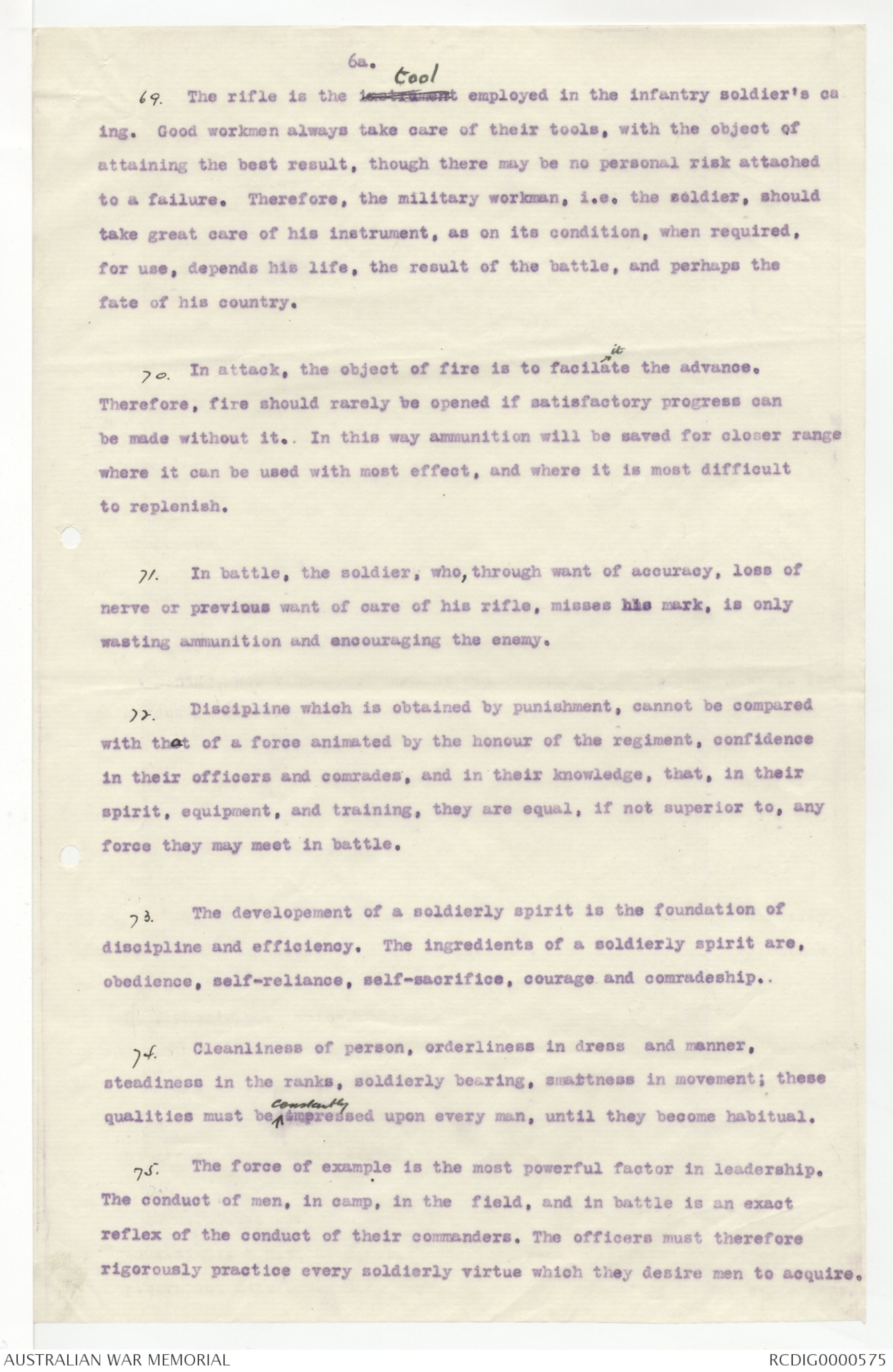
6.
29 Men who are proud of themselves are proud of their unit.
The estimate of the spirit of a regiment is better gauged
by the carriage, turn-out, and actions of its members while
off duty, than by a formal inspection on parade.
30 Economise training time in every possible way. Teach
your unit to assemble punctually and tell off rapidly. Be
severe on men who straggle on parade late, because this
seriously curtails the time available for training.
Move off for work as soon as possible after the time named.
31 Whenever men are resting, or waiting under cover, during
field exercises, seize the time to have them instructed in
some branch of their training.
32 Ability to find the way by night, especially across
country, with and without previous daylight reconnaissance,
with and without the aid of map or compass, is a most
useful accomplishment for any every officer. This should be
practiced whenever opportunity offers.
33 As a preparation for night operations, men should be
taken out at night, at first in small, and later in larger
parties; at first on familiar and later on strange ground;
to accustom them to move about in darkness, and to train
the eye to recognize stationary and moving objects, and
the ear to recognise the direction and distance of sounds.
34 In camp or bivouac, the constant presence of officers in
the men's lines while they are off duty, is undesirable, as
it puts a restraint on the men. On the other hand, on
service, in action, in trenches or in stress, the presence of
the officers is a great factor in keeping up the men's
-7-
spirits, when they see that their officers are no better off
then themselves but still are cheerful, energetic and
sanguine of success.
35 Noise in the lines between Lights Out and Reveille is a
serious offence. It springs from a reckless and selfish
disregard for the well-being of tired men who want to sleep.
Deal severely with disobedience of this instruction, and see that your
orderly sergeant and corporal are insistent. It should be
a point of honour with every company officer that his company
does not offend in this respect.
36 The ability to lecture or to teach without elaborate
notes is rapidly acquired with practice. Continual references
to notes distract the class and destroy attention; while a
lecture written out in extenso and read to the class is next
to useless. If you require notes, let them be as few as
possible and consult them openly and deliberately (not
surreptitiously) during pauses in your remarks, and not
while actually speaking.
37 Never undertake the giving of any lesson, or piece of
instruction, unless you have beforehand thought out what you
are going to teach, and have made a plan (in your mind or
on paper) of the main headings and subheadings of your
subject.
38 Every tactical exercise, no matter how simple, should
be preceded by an explanation of the principles to be
illustrated, and should be followed by a discussion on the
ground, of the merits and faults noted.
8.
39 Rivalry between units to excel is to be encouraged, but all
are working for a common cause, and such rivalry must not be
allowed to impair the spirit of helpfulness of all officers
towards each other and their comrades of other commands.
40 While developing in each man a solicitude for the success
and efficiency of the unit to which he belongs, care must not
be taken that this does not impair his ready co-operation
with the men of all other units under all circumstances.
41 Punctuality is of the utmost importance. A combined
operation may break down completely because some small unit
fails to come up to time. Punctuality does not however mean
readiness before the occasion. This generally involves waste
of time, harassing the men, or unduly curtailing your previous
duty.
42 Proficiency in elementary training is the foundation of
success. The more thorough the grounding in the rudiments,
the more rapidly will the men benefit from advanced training.
Company, Battalion and Brigade drill are merely extensions of
squad drill; the men in the ranks performing only the same
movements which they learnt at recruit drill.
43 The intelligence, receptiveness, and education of men
varies widely. The more stupid, clumsy and unreceptive
the man, the greater the care, effort and patience that should
be devoted to his training.
9.
44 There is a wide difference between drill and tactical
handling of troops. In the former there must always be the
strictest adherence to the prescribed formations and movements;
while in the latter the exact opposite prevails, for it is
impossible, as well as undesirable, to lay down fixed
formations and procedures under the constantly varying
conditions of time, place, weather, military situation, or
morale of the troops.
45 When engaging in any operation of war, whether movement,
protection or battle, every officer must realise that he has to
perform two separate functions, both equally important :-
On the one hand he has to command and direct the operations
and on the other hand to keep up communication with his
immediate superior and neighbouring commanders. The latter
function means that he must report the course of events and
any important changes in the situation, as they occur.
46 Communication between the several units engaged in a
combined operation is so vital to the success of the
operation that it is the duty of all ranks to keep the means
of communication intact; and should unavoidable interruption
occur, to promptly improvise the best means to repair the
interruption.
47 Rapidity in the transmission of information during
reconnaissance or battle is much more important than that the
information should be lengthy and elaborate. At the same time
the accuracy of the message sent must never be sacrificed for
speed.
10.
48 Messages framed in brief concise language save
valuable time in writing, transmitting, reading and recording.
If you can in this way save a few minutes per message it is
well worth while. Practice writing out a typical field
report or message and then seeing how many words you can
save by rewriting it. The practice of clear brevity will
soon become habitual.
49 Success in modern war depends more on moral than
physical qualities. Resourcefulness, energy and
determination count for more than numbers.
50 "Half-hearted measures never attain success in war;
lack of determination is the most fruitful source of defeat".
This maxim, written in relation to battle tactics, applies
uniformly throughout the whole range of an of-ficer's duties.
1A.
51 Courage is not synonymous with reckless exposure to danger.
It is the quality of mind deliberately formed by an earnest
sense of duty to King and Country, by a thorough confidence in
our physical and mental powers, our leaders and our weapons, and
by a firm belief in the jxustice of our cause.
52 It is often better to act quickly, decisively and energetically
upon a provisional plan than to lose time in perfecting
your plan by prolonged consideration. Any plan or action is better
than none at all.
53 To imitate good examples is an effective way of improving
your efficiency. Always be vigilant to recognise the good
points of another man's work and the reason for his success and
then act upon his example.
54 Never commence any parade without an inspection, and make
the inspection always thorough; because carelessness in dress
or equipment means loss of personal pride and slackness of carriag
carriage (which leads to loss of interest and energy), and
consequently of marching and fighting power.
55 The correct fitting of equipment xxxxxx means much to the
comfort of the men during the march, and their condition on
arrival at their destination. Yet it is only the close and
constant supervision of officers and N.C.O's that will make
men careful in adjusting equipment.
56 The efficient use of the rifle can be likened to the
efficient use of other appliances, such as a typewriter,
a musical instrument or a heliograph. It results from the
skilfully co-ordinated action of the powers of judgment, of the
senses of sight and hearing and of muscular control. The
inference is plain, that efficiency in all these cases follow
only after earnest endeavour and constant practice.
2.a.
57 Our service rifle is a powerful and accurate weapon and
the confidence of the men in its power must be carefully
cultivated. They must be taught that rifle fire, well controlled
and well directed, makes infantry most formidable in both attack
and defence.
58 Instill into men that wild firing at long range gives no
result and that the nearer they advance to the enemy, the more
priceless does their ammunition become as replenishments from the
reserves are almost impossible, the only supply available to them,
being that of men rendered "hors de combat".
59 Judging distances is not confined to musketry. It should
be practised laterally, longitudinally ,and vertically. The
frontage occupied by a company, the length of a column marching
across the front, the lateral space occupied by a named frontage
on a distant ridge, the height of a steeple, a tree, or a cliff
are a few examples of measurement which it is useful to be able
to judge accurately.
60 Apart from acquiring efficiency in professional subjects,
every officer must subject himself to careful training in his
physical and mental attributes, such as by exercising the body to
be supple, to stand fatigue, and to do with less then usual food.
drink and rest; by improving the habit and power of observation
by eye and ear both by day and by night; and also developing
the faculty of imagination.
61 The power of imagination is a most valuable faculty for an
officer. It is a faculty which can be developed by practice.
It means the capacity of rapidly constructing a definite picture
of an event, situation, or locality, the description of which is
being heard or read; and is a powerful aid to the understanding
of the impressions desired to be conveyed to the brain by the eye
and ear.
3.A.
62 Soldiers have constantly to perform onerous, disagreeable and
irksome duties. They will do so the more cheerfully if they understand
that these duties are in the interests of their own comfort, health and
safety.
63. A good officer never disdains to perform , occasionally, tasks
and duties which he requires of his men, so that he may be able to form
a correct judgment of the time, degree of skill, and effort required in
their performance, and thereby acquire capacity to recognize when/men are
overtaxed or shirking .For example, it is a useful experience to undertake
a long march in full marching order.
64. Always give your orders firmly, quietly and deliberately, and
always insist on their performance to the letter, Avoid fuss and flurry.
Effective control, through excitement ,is in variably lost
5a.
65. The idea that a soldier must do what he is told without thinking
is obsolete. It is still a fact that he must obey unhesitatingly, but he
must also think about, and understand what he is doing. An express order
for some executive action will be all the better performed, if the recipient
understands the object aimed at.
66 Firmness in command invariably wins the respect of the men, provided
it is exercised with absolute fairness and impartiality. Nothing so damages
an officer's prestige as unfairness or injustice. Remember that the strictest
justice is the fairest mercy.
67 When drilling troops, or lecturing, stand well away and adopt a respectful but
soldierly attitude. Mannerisms, i.e., moving about or moving the limbs,
except for the purposes of illustration, fidgets the men and distracts their
attention.
68 An officer cannot fraternise with members of the rank and file
without loss of status. If he does so, he cannot expect to have respect
and control, and will often find himself in an unenviable positionsas regards,
(a) His brother officers, (b) his duty and responsibility, (c) his position,
particularly when required to administer praise, blame or punishment, impartially.
6a.
69. The rifle is the instrument tool employed in the infantry soldier's ca
ing. Good workmen always take care of their tools, with the object of
attaining the best result, though there may be no personal risk attached
to a failure. Therefore, the military workman, i.e. the soldier, should
take great care of his instrument, as on its condition, when required,
for use, depends his life, the result of the battle, and perhaps the
fate of his country.
70. In attack, the object of fire is to facilitate the advance.
Therefore, fire should rarely be opened if satisfactory progress can
be made without it. In this way ammunition will be saved for closer range
where it can be used with most effect, and where it is most difficult
to replenish.
71. In battle, the soldier, who, through want of accuracy, loss of
nerve or previous want of care of his rifle, misses his mark, is only
wasting ammunition and encouraging the enemy.
72. Discipline which is obtained by punishment, cannot be compared
with that of a force animated by the honour of the regiment, confidence
in their officers and comrades, and in their knowledge, that, in their
spirit, equipment, and training, they are equal, if not superior to, any
force they may meet in battle.
73. The developement of a soldierly spirit is the foundation of
discipline and efficiency. The ingredients of a soldierly spirit are,
obedience, self-reliance, self-sacrifice, courage and comradeship.
74. Cleanliness of person, orderliness in dress and manner,
steadiness in the ranks, soldierly bearing, smartness in movement; these
qualities must be constantly impressed upon every man, until they become habitual.
75. The force of example is the most powerful factor in leadership.
The conduct of men, in camp, in the field, and in battle is an exact
reflex of the conduct of their commanders. The officers must therefore
rigorously practice every soldierly virtue which they desire men to acquire.
 Jacqueline Kennedy
Jacqueline KennedyThis transcription item is now locked to you for editing. To release the lock either Save your changes or Cancel.
This lock will be automatically released after 60 minutes of inactivity.